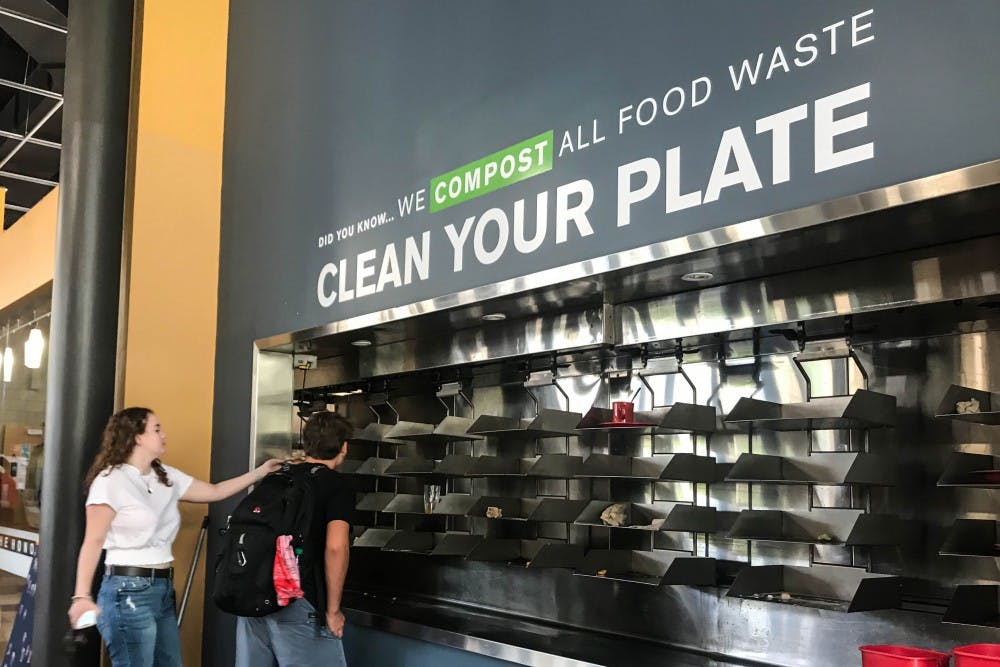Sun Devil Dining provides an easy avenue for students to eat as much as they want to for a fixed price depending on the time of day. For some, however, an all-you-care-to-eat dining style can be synonymous with all you care to waste.
Without the incentive of cost to deter students from wasting food, initiatives such as the Zero Waste program encourage students to be cognizant of their environment and compost the food they plan to throw out.
The goal of the program is ultimately to achieve no solid waste, decreasing the University's waste overall by 30 percent and cutting its contribution to landfills by 90 percent.
Since the start of the Zero Waste program, the weight in tons of composted food has been increasing rapidly, indicating that the program has been successful at diverting waste from landfills, according to University data.
The compost collected from dining halls has increased from 74.9 tons in fiscal year 2013 to 838.08 tons in fiscal year 2018.
Between fiscal year 2017 and 2018, the total dining hall compost collection nearly doubled from 472.92 tons to 838.08 tons, data shows. The University says the explanation for the jump is the addition of composting at the Tooker House dorm, Taylor Place and the Student Pavilion. This, however, does not necessarily mean that dining halls are more wholly sustainable.
Daniel Fischer, an assistant professor in the School of Sustainability, said there is always a trade off between types of waste.
“With the increasing (amount) of compost, that's just another debate that we could have,” Fischer said. “What is really good and what is less bad? So, there's always this trade off. Of course it's better to compost than to just throw it into the regular trash bin."
Although the Zero Waste program has encouraged students to compost rather than to trash their food waste, if the ultimate goal is to reduce waste altogether then consumer needs must be considered as well.
Krista Hicks, sustainability manager for Aramark, said that the Zero Waste program also aims to reduce the amount of waste generated in the first place by raising awareness among the student body.
“The majority of food waste from our locations is post-consumer organics, meaning things discarded by our customers,” Hicks said. “Students can help with waste reduction by taking only what they can eat from dining halls.”
Although students may not be reducing their overall waste, they are making the shift from landfill waste to compost. From fiscal years 2017 to 2018, major dining halls across campuses showed an increase in organics collection. University data for 2018 also includes compost data from the new Tooker House dining hall on the Tempe campus as well as the Taylor Place dining hall on the downtown Phoenix campus, contributing to the overall increase in compost collection.
Sustainability Practices at the University partner with Aramark on some events to aid with student engagement. Their main goal is not to focus on quantitative food waste, but rather to take a different approach in focusing on food security for students, the key consumers in this setting.
Susan Norton, the program manager of Sustainability Practices, said the program primarily partners with Aramark on the annual Weigh the Waste campaign, where students are asked about the reason behind their food waste when they approach the dish return in dining halls.
“We're not trying to shame anybody,” Norton said. "That’s not the point at all. We're just trying to bring an awareness about the problems with food insecurity and ask the questions of what we can do on the back end to help students to want to clean their plate or eat everything on their plate.”
While initiatives like the Zero Waste program divert landfill waste to compost facilities, the culture of consumption at ASU seems to be changing.
“People establish routines," Fischer said. “They don't make that choice deliberately, consciously, or in a rationally reflective way every day. Many of our actions in consumption are routinized behaviors.”
Ultimately, one of the keys to convincing students to waste less is for University programs to lead by example, Fischer said.
“We have research showing that if students perceive the University to preach sustainability but not (do) anything about it, that's not contributing to the sustainability learning and is even putting them off in some sense,” he said. “So if (students) can really observe... that (the) University is really taking this seriously and taking this on this challenge of becoming more sustainable, then this has an impact on the students.”
Reach the reporter at kalbal@asu.edu or follow @karishmaalbalon Twitter.
Like The State Press on Facebook and follow @statepress on Twitter.




